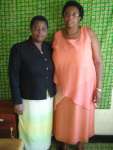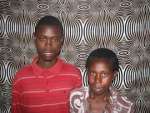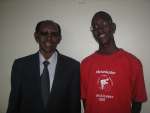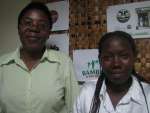Kantarama Peace & Mukamana Marie Joie
Kantarama Peace’s daughter, Mukamana Marie Joie, is confused about marriage. She asks her mother, a member of a mother’s union who has helped many girls and given them advice, numerous questions. Kantarama Peace emphasizes never to give up when it comes to love, because as long as its for love, anyone can achieve success.
Nyirahabimana Consolee & Mukeshimana Godelive
Nyirahabimana Consolee tells Mukeshimana Godelive stories about the way young girls acted before she was born, drawing on her own life and the stories her aunts told her. They include everything from weaving, the to difficulties with accepting advice, dealing with mothers-in-law, giving birth, changing traditions about co-wives, and much more.
"I can’t confirm that all the poor take a wrong way which will cause them more pain because of poverty. So even the poor can keep their dignities in their poverty and finally get their own families." Nyirahabimana Consolee
Nsengimana Jean Paul & Hitimana Jean de Dieu
Nsengimana Jean Paul has changed his religion as an older man, but recalls the old prayers and rituals from when he was younger. He explains to Hitimana Jean de Dieu about witch doctors, night dancers, and how to properly please the gods for good fortune, and describes his encounters with devils that made him turn to the gospel.
"You pray to the God you know, you understand, and in good order. It is clear that if you ask you will receive, if you knock the door they will open for you, if you look for you will get." Nsengimana Jean Paul
Nyirangendahimana Consolate & Muhire Noel
Muhire Noel wishes to know everything about the family members he was never able to meet, especially his great grandparents, and Nyirangendahimana Consolate tells him stories about each person. Nyirangendahimana Consolate shares a family history that includes her father's love of listening to prayer, lighting her grandfather's cigarettes, and drawing strength from her mother. She also reminds Muhire Noel that the most important thing is to learn to be calm, overcome conflict, and always believe the future is bright.
Kaberuka Anatole & Mulima Ngautabana Yves
It is well known in Rwanda that ethnic tribes coexisted peacefully before the genocide. Kaberuka Anatole explains to his grandson Mulima Nyautabana Yves about how the colonial regime worked to turn tribes against one another, cultivating hatred and jealousy in order to maintain control and exploit Rwanda. In a history tale that begins before Belgian rule, Kaberuka Anatole shows how the colonial regime treated the country like playing a game of cards.
Ngunga Deogratius & Mugabo Richard
Mugabo Richard asks his elder about colonialism: How were they able to take control of Rwanda? What types of things did his father witness under colonialism? Why did this they decide to divide Rwandan society? Ngunga Deogratius describes the injustices he saw like poisoning of the water, burning of houses, needless slaughter of cattle, etc. Ngunga Deogratius describes the misunderstandings between the colonial settlers and indigenous people on issues like nutrition, religion, and ethnic divisions. He also tells his son of his time in a dangerous territory.
Murekatete Adrie & Umuhoza Alexie
Murekatete Adrie, Umuhoza Alexie’s aunt, wants to tell her niece about a former classmate who was orphaned in the genocide. Although lucky enough to be adopted and be given an education, she got in trouble at university by becoming involved with a young man who left her after she became pregnant by him. She wants to warn Umuhoza Alexie to avoid temptations and concentrate on her studies. “I am sure you cannot suffer when you have education.”
Habineza Pascal & Irakarama Joselyne
Irakarama Joselyne’s uncle, Habineza Pascal, is passionate about the value of a cow, and enthusiastically answers all of her questions regarding this Rwandan culture. Although she already understands the benefits of a cow, she does not fully understand the value of a cow. Irakarama Joselyne wants to know the reason why dowry is almost always done with a certain number of cows, and her uncle explains the significance of this transaction. He even touches upon an example of a government program called “one cow per family,” a system that helps fight poverty and malnutrition.
Gahongayire Chantal & Mzagisenga Salima
Sweeping very early in the morning used to be a girl’s task, and girls also hid themselves from the sight of others. Mzagisenga Salima is curious to hear from her mother these and other stories from Rwandan culture. Were they really schooled separately? Did boys mainly hunt? Gahongayire Chantal fills in these gaps, speaking not only about her own girlhood, but her mother’s as well. Mzagisenga Salima asks for more stories. Family stories about Mzagisenga Salima’s mother are told about a close mother-daughter bond, and about her grandmother’s great value for getting support from other women.














